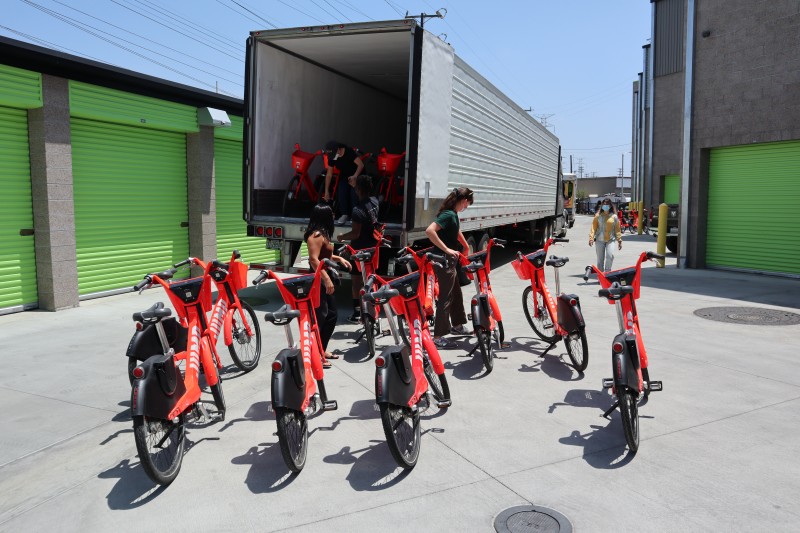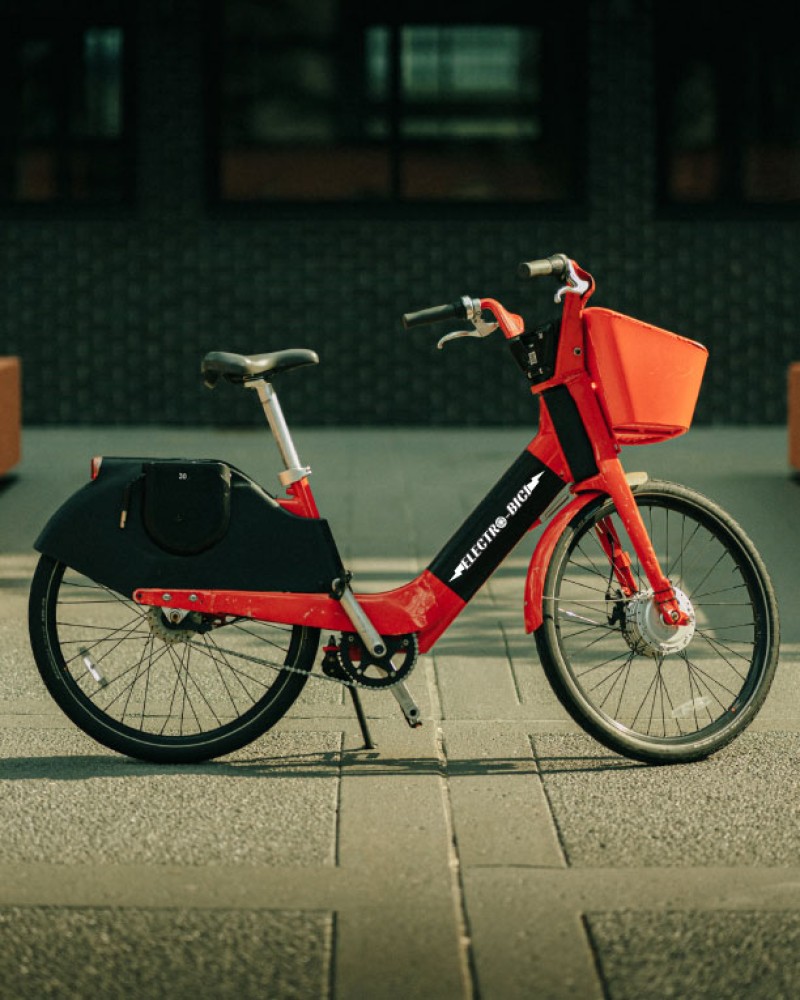A Free E-Bike Lending Program Just Launched In The San Fernando Valley. Here’s How It Works

The Electro-Bici program received 100 refurbished electric bikes from the New York-based Shared Mobility Inc., which has provided "e-bike libraries" in several U.S cities.
A new mobility program will give Northeast San Fernando Valley residents access to free e-bikes.
Dubbed Electro-Bici, the Pacoima-centered program will function as a “bike library,” lending e-bikes long-term to residents there and in neighboring communities. This won’t be the bike-sharing racks stationed on sidewalks that you might see in other parts of L.A. County — residents who join the program can keep the bikes for up to nine months.
Initially about 30 bikes will be available to the first “cohort” of riders, said Andres Ramirez, executive director of People for Mobility Justice, but that could be scaled up to include more of the program’s 100-bike fleet.
Ramirez’s group is one of the local organizations partnering to run the program, and he said they're excited to see how residents use them.
“For sure one being commuting — commuting to work, and to school,” he said. “Commuting to do regular errands, go to the doctor, getting groceries — the bikes do have a basket, so folks will be able to use it to carry things.”
One key goal is “getting cars off the streets” in a community that’s “surrounded by toxic facilities,” Ramirez said. Pacoima residents have long suffered from dangerous air pollution, even by L.A.’s smoggy standards.
He also hopes the e-bikes will become personal economic engines for residents.
“There's a lot of people in the community that hustle doing street vending, doing underground economy work, and how can these bikes be an asset to that? That's something that we definitely want to nurture.”
Bike locks and helmets will be provided to riders, along with a series of training classes on how to use the bikes and rules of the road. The program is also hiring a bike mechanic and will handle repairs for cohort riders free of charge.
Ramirez also noted that staff “don't want to put the burden on community members to charge at home,” so while riders have that option, staff will also have a centralized site where additional batteries will be charged and can quickly be swapped out.
Another goal, Ramirez noted: that the sustained use of dozens of bright red, “very visible” bikes will spark conversations with city and county transportation agencies “about improving infrastructure in the Valley.”
“We feel that that’s an opportunity,” Ramirez said. “Let's get more infrastructure in here, build out better bike lanes, build out clear crosswalks, better lighting, things like that… to help folks feel comfortable with sharing the roads.”
After the nine-month pilot period, the plan is to assess how well the bikes worked for residents and develop an equitable membership program, Ramirez said, with an emphasis on “accessibility and affordability.”

If the red e-bikes look familiar, that’s because they were previously part of Uber’s Jump fleet. But after the ride-hailing giant lost $2.9 billion in the early months of the pandemic, it sold off its e-bike and e-scooter services to Lime. In the process, tens of thousands of the company’s older model e-bikes were scrapped. That upset many mobility advocates, who argued the bikes could have been repurposed, especially given the high demand for e-bikes since the pandemic.
Eventually, Jump did donate some of its bikes, 3,000 of which were given to Shared Mobility Inc., a New York-based organization. The group has been refurbishing the bikes and is expanding its e-bike libraries to several U.S. cities, including Durham, N.C., Chicago and now Los Angeles.
It’s worth noting that Pacoima’s e-bike program represents a community-led effort to bring free, accessible e-bikes to communities that for-profit mobility companies like Jump, Lime and Bird mostly stayed out of. Equitable micromobility is definitely not their strength, and Ramirez said that was a motivating factor in providing repurposed e-bikes to the majority Latino neighborhoods in the northeast Valley.
“That's why we felt [we should] do it and do it in a way that we feel will work better for the community,” he said.
Electro-Bici is being funded through a community emissions reductions grant from the L.A. Department of Water and Power. The program is being managed locally by People for Mobility Justice and Pacoima Beautiful.
If you live in the Northeast San Fernando Valley and are interested in getting an e-bike, you can apply online to join the Electro-Bici program.
Associated Program: Electro-Bici